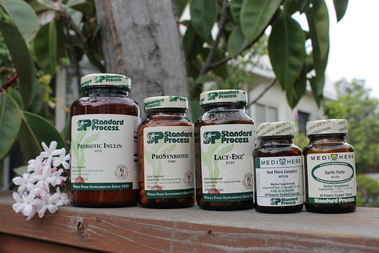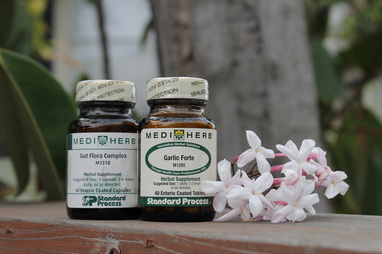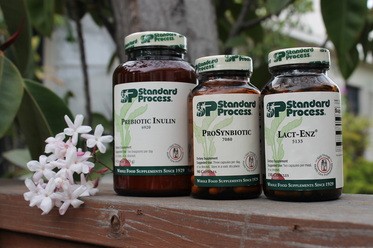#1) Putrification: linked to a high fat and meat diet and low fiber. This leads to increased bacteriodes and induces bacterial urease and beta-glucuronidase. This type of dysbiosis is linked to colon and breast cancer.
#2) Fermentation excess: is caused by carbohydrate intolerance due to excess fermentation by normal bacteria in overgrowth. Symptoms include distention, flatulence, diarrhea, constipation. These patients typically react to psyllium or fruits. Can also be due to excessive presence of yeasts (candida).
#3) Deficiency: due to excessive antibiotics or a diet low in soluble fiber may create a deficiency of healthy flora. This has been linked to food intolerance and IBS (irritable bowel syndrome). Can occur with putrefaction dysbiosis.
#4) Sensitization: is abnormal responses to normal flora or excessive presence of pathogenic flora which lead to deranged immune function leading to autoimmune disease or chronic skin disorders (psoriasis, rosacea, eczema).
The major causes of Dysbiosis are:
- Antibiotics
- Antiacids
- Stress
- Diet including sulfur, excessive protein, excess refined carbohydrates, lack of fiber, excess fat
- Decreased immune status
- Decreased gut motility and poor digestion function
- Intestinal infection and infestation
- Altered intestinal pH
Diseases linked to Dysbiosis are:
- Autoimmune Disease
- Crohn's disease
- Ulcerative colitis
- Rheumatoid arthritis
- Ankylosing spondylitis
- Graves disease
- Chronic active hepatitis
Gut Disorders
- Irritable bowel syndrome (There is now considerable evidence implicating ID as a significant factor in IBS)
- Flatulent dyspepsia
- Certain types of food sensitivities
- Chronic diarrhea
- Diverticular disease
- Gastrointestinal infections
Other Disorders
- Asthma and Hay Fever
- Poor Immunity
- Chronic Skin disorders (psoriasis, eczema, rashes etc)
- Breast and Colon Cancer
- Lack of Well Being and Low-Energy (Adrenal Depletion
- Neuropsychiatric problems especially autism?
- Obesity?
A key part of the treatment approach to ID is to reduce the presence of Klebsiella or other potentially pathogenic organisms.
A Low Starch Diet decreases poor immunity and will also decrease gastrointestinal inflammation and the resultant increased permeability .
Klebsiella in the bowel uses starch as a major source of nutrition.
Studies have shown in 200 patients on a low starch diet had their disease halted. However, a significant result may take 6 months or more. 95% effective.
#2) Fermentation excess: is caused by carbohydrate intolerance due to excess fermentation by normal bacteria in overgrowth. Symptoms include distention, flatulence, diarrhea, constipation. These patients typically react to psyllium or fruits. Can also be due to excessive presence of yeasts (candida).
#3) Deficiency: due to excessive antibiotics or a diet low in soluble fiber may create a deficiency of healthy flora. This has been linked to food intolerance and IBS (irritable bowel syndrome). Can occur with putrefaction dysbiosis.
#4) Sensitization: is abnormal responses to normal flora or excessive presence of pathogenic flora which lead to deranged immune function leading to autoimmune disease or chronic skin disorders (psoriasis, rosacea, eczema).
The major causes of Dysbiosis are:
- Antibiotics
- Antiacids
- Stress
- Diet including sulfur, excessive protein, excess refined carbohydrates, lack of fiber, excess fat
- Decreased immune status
- Decreased gut motility and poor digestion function
- Intestinal infection and infestation
- Altered intestinal pH
Diseases linked to Dysbiosis are:
- Autoimmune Disease
- Crohn's disease
- Ulcerative colitis
- Rheumatoid arthritis
- Ankylosing spondylitis
- Graves disease
- Chronic active hepatitis
Gut Disorders
- Irritable bowel syndrome (There is now considerable evidence implicating ID as a significant factor in IBS)
- Flatulent dyspepsia
- Certain types of food sensitivities
- Chronic diarrhea
- Diverticular disease
- Gastrointestinal infections
Other Disorders
- Asthma and Hay Fever
- Poor Immunity
- Chronic Skin disorders (psoriasis, eczema, rashes etc)
- Breast and Colon Cancer
- Lack of Well Being and Low-Energy (Adrenal Depletion
- Neuropsychiatric problems especially autism?
- Obesity?
A key part of the treatment approach to ID is to reduce the presence of Klebsiella or other potentially pathogenic organisms.
A Low Starch Diet decreases poor immunity and will also decrease gastrointestinal inflammation and the resultant increased permeability .
Klebsiella in the bowel uses starch as a major source of nutrition.
Studies have shown in 200 patients on a low starch diet had their disease halted. However, a significant result may take 6 months or more. 95% effective.
Low Starch Diet
|
Increase:
- Meat and fish - Beans and peas - Nuts - Vegetables - Salads - Fruit |
Decrease:
- Bread - Potatoes - Chips - Rice - Pasta - Cereals - Cakes - Biscuits - Soft Drinks - Sugar |
Considerations:
- Sprouted Wheat Bread - Brown Rice |
The Gut Flora ProtocolThis protocol is based on a weed, feed and seed approach.
It is based on a weekend/week day cycle. For best results, 6 to 10 cycles should be carried out. The key antimicrobial herbs such as Oregano and Anise oils and Garlic (optional) provide the weeding. Prebiotic Inulin provides the feeding treatment, but is done in conjunction with Grape Seed and Green Tea to depress pathogenic bacteria. Combine with the appropriate diet. |
On Weekends- Take 2 Gut Flora Complex capsules, 3 times a day throughout the day/
- In Extreme cases Garlic (enterically coated) 2-2 times a day On Weekdays
- 1 tsp PreBiotic Insulin 2 times a day
- 1 Vitanox 2 x a day ( green tea and grape seed suppresses growth of bad bacteria) - 1 Prosybiotic 3 times a day. (is the probiotic) or Lact-Enz |
If you should have any questions please contact me anytime.
Judy Doeppel
_______________________
E: judydoeppel.verizon.net P: 424-247-3610
Judy Doeppel
_______________________
E: judydoeppel.verizon.net P: 424-247-3610




